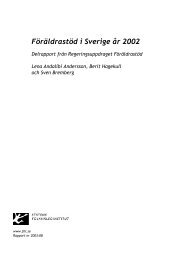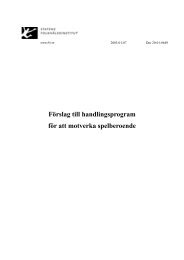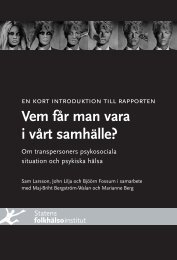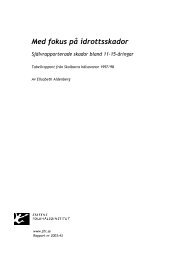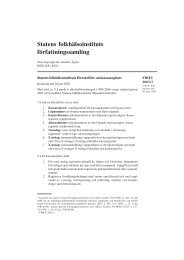Spelreklam och spelberoende - Statens folkhälsoinstitut
Spelreklam och spelberoende - Statens folkhälsoinstitut
Spelreklam och spelberoende - Statens folkhälsoinstitut
You also want an ePaper? Increase the reach of your titles
YUMPU automatically turns print PDFs into web optimized ePapers that Google loves.
14 spelreklam <strong>och</strong> <strong>spelberoende</strong> – en intervjustudie<br />
Avoidance is the most common way of coping with unwanted impulses<br />
and impressions from gambling advertising. Along these lines, the participants<br />
in the study mentioned: not entering shops that offer gambling services,<br />
changing television channels when advertising is shown, not reading<br />
the sports section of newspapers, including gambling companies in their<br />
e-mail program’s junk filter, avoiding sports programs on television, renting<br />
television series on DVD rather than watching them when aired with<br />
commercial breaks, and throwing away postal advertising without opening<br />
the envelopes. Some of the participants in the study told how they coped<br />
intellectually with gambling advertising, such as by trying to think rationally<br />
when watching advertising. For instance, one person, who was tempted<br />
by advertising for Internet poker, resisted by thinking that he would not<br />
win in the long run and that, if he gave in to the temptation, he risked a<br />
relapse into compulsive gambling.<br />
The study also accounts for how the persons interviewed more generally<br />
react when confronted with gambling advertising, and what thoughts they<br />
have on the promotion of gambling in Sweden. The opinions and experiences<br />
presented are those of persons who have years of experience of gambling<br />
problems – their own and those of others – and can therefore be valuable to<br />
those, in the gambling industry or elsewhere, who have an interest in<br />
responsible provision of gambling.<br />
A majority of the participants who had quit gambling said that they had<br />
been bothered by advertising. They reported that gambling advertising,<br />
both specific kinds of advertising and in general, made them uneasy. Such<br />
feelings were most often aroused by aggressive advertising, i.e. advertising<br />
that suddenly appears on television or is otherwise pushy and hard to<br />
avoid. Uneasiness is felt for a variety of reasons: the advertising provides<br />
impulses to gamble, the person does not want to think about gambling<br />
since it has entailed so much trouble, or the person is disgusted by exhortations<br />
to gamble since he or she knows that gambling can ruin a person’s life.<br />
Among those interviewed, eight people accepted gambling advertising<br />
without much reservation. At most, they questioned the wording of some<br />
ads and the volume of advertising for some games. Ten people were moderately<br />
critical. They criticized the form and content of several forms of<br />
advertising and were positive to restrictions of gambling advertising. Seven<br />
people were strongly critical. They expressed aversion to all or most forms







